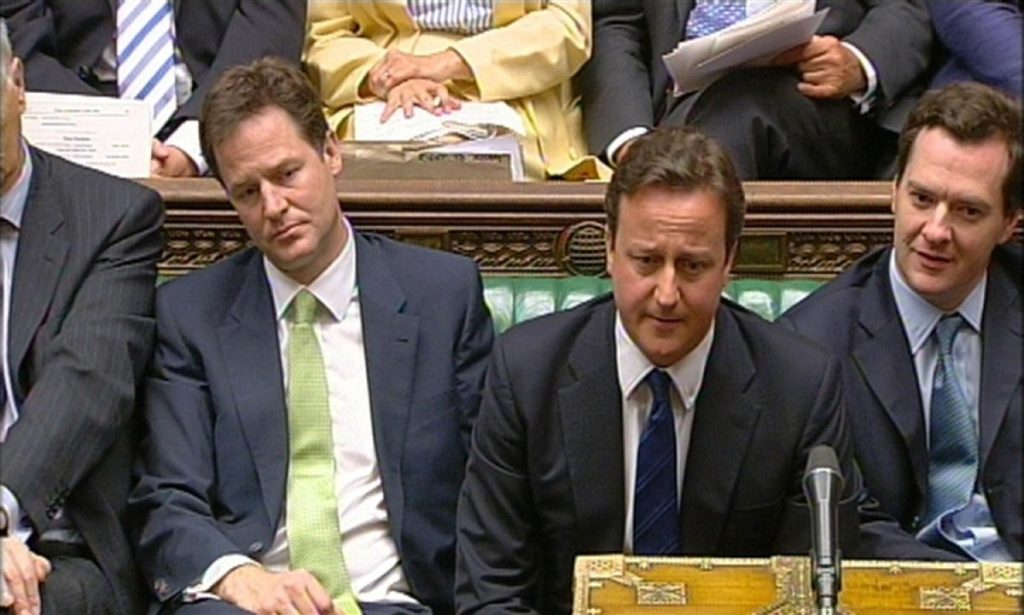PMQs sketch: What teenage girls and David Cameron have in common
David Cameron has taken to treating Ed Miliband with a sort of pitiable contempt. The Speaker had more of an impact than the man supposed to be giving him a hard time.
By <a href="http://twitter.com/alex__stevenson">Alex Stevenson</a>
It had started out so promisingly. In their first bouts Cameron versus Miliband seemed an evenly matched contest. The Labour leader appeared capable of genuinely winding Cameron up. The PM is at his worst when he is made to appear posh; Miliband was getting quite good at bringing out Cameron's innate uppityness.
Since then, alas, the dynamic has changed. Miliband has become increasingly placid. He lacks bite. Today, he barely managed to open his mouth.


Part of the problem may be his penchant for short questions. These are presumably supposed to show him as a direct sort of guy. But the bleating tone he employs – that sort of rebuking regretfulness usually deployed by teachers at a moment's notice – makes it seem less impressive. "We read in the papers" that Cameron has scrapped sentencing discounts, he began. "Has he?" And, as he changed tack halfway through: "He knows he's in a total mess on his sentencing policy. Can the prime minister tell us why he's made such a mess of his health plans?"
That was it, nothing more. PMQs is an opportunity for ranting, railing, vituperative attacks against the government. Brief questions are a way of waiving the right to do so. They're a waste. And Cameron whose first, defensive reply would have made a stonewalling government press officer proud, demonstrated that by revealing absolutely nothing at all.
You could tell how the exchange had gone from the demeanour of justice secretary Ken Clarke. At the start he sat up, thoroughly wide awake for once. His hands were clasped in his lap. He looked like a concerned housewife.
"I think the right honourable gentleman ought to do something more useful than just read the newspapers," Cameron observed, before pointing out that shadow justice secretary Sadiq Khan had called the sentencing approach a "perfectly sensible vision".
Just a handful of moments later, Clarke was chuckling away. All was well with the world. Quite the transformation.
"I'm not surprised he wants to move on," Cameron crowed. Miliband's sudden leap, without any sort of stinging criticism, was simply hopeless. Jumping topic just looked like jumping ship.
"Bandwagon number one hits the buffers," Cameron continued. But what about bandwagon number two?
Miliband had chosen to focus next on the NHS. Not a bad bet, you'd think. It was only yesterday that the prime minister was announcing a series of humiliating concessions. And Miliband made a decent point by quoting pre-election Cameron promising no top-down reorganisations.
But Cameron was the one on the offensive in response, attacking Labour as "the party in favour of cutting funding to the NHS". In Wales, he pointed out, waiting times were increasing even as spending cuts were imposed. And then came Miliband's reply. "He's completely shameless and he will say anything," he said despairingly. The government benches erupted in laughter. They're going to be repeating that back to him for many months to come.
It was at this moment that Cameron offered his withering look. It was that sort of wrinkled-nose disgust, mingled with a mild surprise that anyone could be so repellent. It was the kind of look which teenage girls are such experts at using on teenage boys. And it was that pinched-nose attitude, having to deal with the bad smell opposite that he suggested Miliband's remarks on waiting times weren't quite accurate.
Speaker John Bercow quickly intervened. It's just not the done thing to suggest any MP is a liar (otherwise it would happen all the time, presumably). "He won't suggest the leader of the opposition was trying to mislead the House," he reminded Cameron. So Bercow ordered him to withdraw the remark. Cameron, stung by the rebuke, replied: "He gave an interesting use of facts in terms of waiting times which went down in the NHS."
That, as Miliband pointed out, was far from a withdrawal. "He's rattled by the health service," he observed, trying his best to look pained and upset. "Withdraw!" Labour MPs roared. Cameron, studiously ignoring them, looked down at his folder. Encouraged, Miliband was finally coming up with some sort of a finish.
Cameron, he said, was "reckless". He "breaks his promises" (that's effectively the same as calling someone a liar, but is perfectly acceptable under parliamentary rules). He "doesn't think things through". And, worst of all: "He's proved the oldest truth in politics – you can't trust the Tories on the NHS."
After such a weak performance, it was Cameron's opportunity to polish off Miliband. But he completely messed up the coup de main. It was not so much that he jumped on that old "series of bandwagons" bandwagon again. It was more that he and his parliamentary party were not quite on the same page. "Where is his plan for reforming the [insert public service here?]" he demanded. "Nothing!" they chanted back. Thoroughly regrettable. It summed the whole exchange up: this was one of those moments of parliamentary history which are best forgotten.
Perhaps the PM had been dragged down by Miliband's performance. Funnily enough, it was Cameron who gave Miliband an excuse which will actually probably be accepted by those on the left.
"The best that can be said about this performance is quite rightly he wasn't thinking about politics on his honeymoon," he observed. Mmm, you could see Labour backbenchers thinking. Good point. Let's hope Miliband gets the sand out of his shoes by next week.

